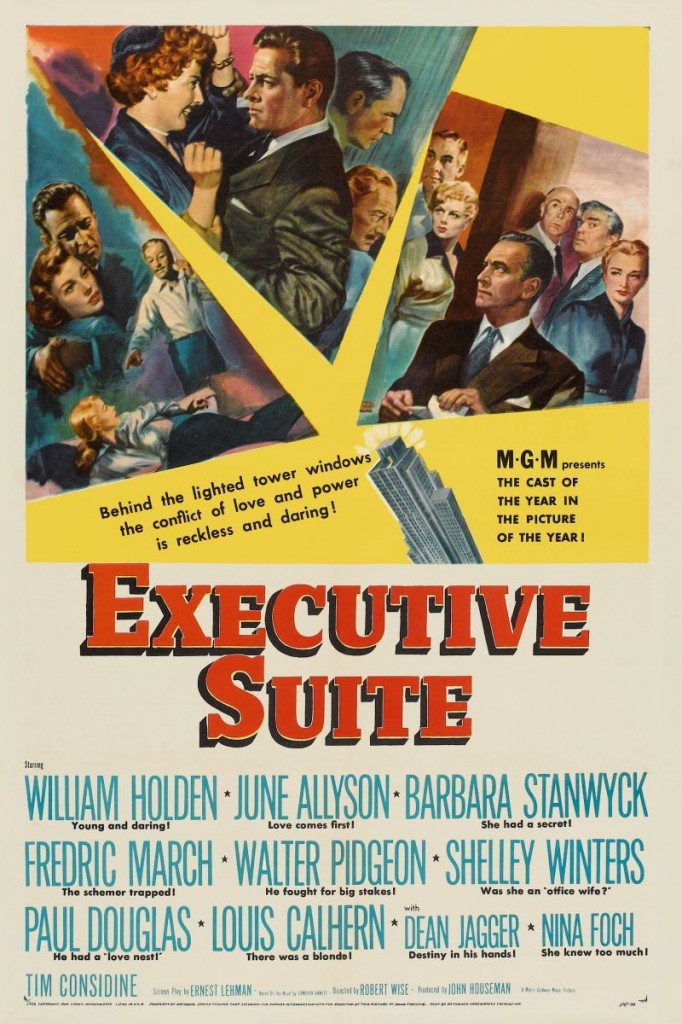 Our fourteenth choice of 2014 is the all-star big business melodrama Executive Suite (1954). How all-star? The cast boasts no less than seven previous Academy Award nominees (of whom three had won, one of them twice; and one, Shelley Winters, who would go on to win two times later in her career), and another actress (Nina Foch), who would snag herself a nomination for this film. That is what I call a powerhouse cast.
Our fourteenth choice of 2014 is the all-star big business melodrama Executive Suite (1954). How all-star? The cast boasts no less than seven previous Academy Award nominees (of whom three had won, one of them twice; and one, Shelley Winters, who would go on to win two times later in her career), and another actress (Nina Foch), who would snag herself a nomination for this film. That is what I call a powerhouse cast.
Besides the powerhouse cast, what else has this melodrama got going for it? It is based upon a popular novel by Cameron Hawley, who wrote novels around big business and financial interests (Cash McCall was also his); it was produced by the prestigious John Houseman, who had worked with Orson Welles and much later would win an acting Oscar in 1973’s The Paper Chase; and it was directed by versatile Robert Wise, who already had The Curse of the Cat People, The Body Snatcher, Blood on the Moon, The Set-Up, The Day the Earth Stood Still and The Desert Rats under his belt. Wise would go on to two directing Oscars (both for musicals!) himself. As you can see, there was plenty of talent involved in the making of this motion picture.
Executive Suite was one of a few films, really the first, built around big business concerns released within a short period — The Man in the Gray Flannel Suit and Patterns are others — which explore corporate ethos and behavior of the men and women behind closed company doors. These films, and others, form a fascinating sub-genre that begin to question the business end of the American Dream, and not in favorable terms. These stories wondered whether a balance could be found between work life and personal life — or if such a balance was even possible. Executive Suite is also notable for asking whether big business’ major obligation was toward society as a whole, to provide honorable work and worthwhile product, or if it was to deliver ever-increasing dividends to stockholders. Those concerns reflect the post-war period of prosperity during the 1950s, but just as important, those issues remain relevant and provocative today.
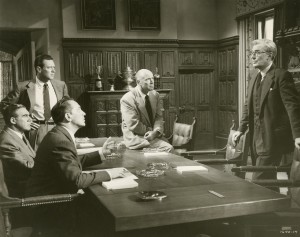
The drama begins unusually, with the camera perspective of company president Avery Bullard’s point-of-view as he leaves a Friday meeting in New York. Suddenly, however, he has a stroke (or heart attack) and dies on the sidewalk.
Only one company officer is aware of the boss’ death, George Caswell (Louis Calhern), and his first move is to sell Tredway stock at a rush so that he can buy it back the next week at a profit.
Finally the word spreads and the five company vice presidents are summoned back to the Allentown, Pennsylvania headquarters to choose a successor over the weekend (before the markets are to open on Monday, to blunt the effect that the president’s death would have on the stock value). Bullard had never appointed an executive vice president — this was to take place the following week — so each of the five vice presidents has a theoretically equal chance to assume the presidency. But office politics are never equal or fair, and comptroller Loren Shaw (Fredric March) moves quickly to consolidate his position as the lead candidate. Shaw covets the presidency and honestly believes that his fiscal management skill is just what the company needs most.
Senior officer Frederick Alderson (Walter Pidgeon) is flabbergasted that Shaw moves so quickly (undermining his own authority), but he also understands that Bullard did not have the confidence in him to be next in line or he would have been appointed as such. The other vice presidents are Jesse Grimm (Dean Jagger) from manufacturing, Don Walling (William Holden) from design and J. Walter Dudley (Paul Douglas) from sales. Grimm doesn’t want the job, as he has already told colleagues that he intends to retire; Walling isn’t interested in anything else but designing solid furniture and perfecting his new veneer process; Dudley would love the job but inwardly realizes that it is above his talents and skills. So the presidency seems to be headed toward Alderson or Shaw, with Shaw already working to marshal the four votes necessary from the seven board members who will decide the issue.
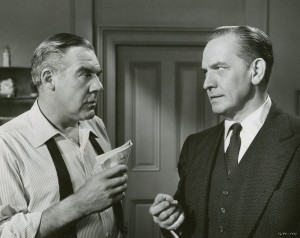
The two other board members are the wild cards on the table. One of them is George Caswell, who has already begun to regret his decisive action to make a quick profit. The candidate who can guarantee that he will recoup his stock dump money will get his vote. And then there is Julia Tredway, daughter of the company’s founder (who eventually threw himself off the headquarters Tower) and lover of Avery Bullard, who has just died. Julia Tredway is unfulfilled and dreadfully unhappy, having given her love to a father and a businessman who both gave their love and attention to the business rather than her. Julia is bitter and vengeful and doesn’t know what to do other than to divest herself of the 35% of the company that has ruined her life.
So it all comes down to the weekend board meeting where a new president will be elected and the fate of the company will be decided. But, of course, because this is a melodrama, there is much more to the situation than that. Alderson would rather not openly battle Shaw for the presidency, but his wife Edith (Virginia Brissiac) demands that the company repay her for all the years she has spent in the shadows. Dudley is married but he lavishes all of his attention on his executive secretary Eva Bardeman (Shelley Winters). What’s more, somebody catches Dudley with Eva when he is supposed to be on a company trip. Caswell has a much younger wife (Lucille Knoch) who is bored with all the company shenanigans, and he treats her more like a pesky girlfriend than a wife. Walling would love to stay out of the office politics and keep his wife Mary (June Allyson) happy, but a stirring of ambition has also begun to make itself felt in his soul. The company’s executive secretary, Erica Martin (Nina Foch), keeps everything running smoothly, but beneath her professional facade she is heartbroken at the direction that events are turning. And Julia Tredway wanders through the Tower offices feeling sorry for herself and finally comprehending the forces that made her father jump to his death.
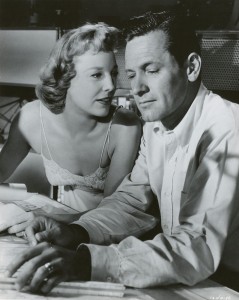
Shaw, the comptroller who believes that the company owes its stockholders first and foremost, just about has things wrapped up, especially after conferring with Caswell and Dudley. But he doesn’t account for the conscience of McDonald Walling. Spending time at the manufacturing plant, Walling has come to see how much the plant means to the community, and comes to believe that Tredway cannot continue to betray that trust by building inferior furniture (the inexpensive KF line) or refusing to reinvest money into research and development. After wrestling with his conscience for half of the film, he finally commits himself to running for the presidency himself — or at least keeping Loren Shaw out of the office. Alderson backs him and Grimm might, but he is off fishing and doesn’t even know about the crisis. If Grimm can be convinced, that leaves Julia Tredway as the vote he will need. Before the big meeting Walling meets with Julia, and it doesn’t go well; she has already been convinced to let Shaw control her proxy vote. And as the meeting finally begins, Alderson and Grimm are nowhere to be found. Five directors constitute a quorum, so Walling has to sit by and stew while Shaw controls the meeting and takes an initial vote. But things do not progress as Shaw predicts, and a second vote is necessary.
Walling stalls for time, asking Shaw about his business philosophy. While Shaw is pontificating about the importance of profits Alderson and Grimm arrive. Shaw is persuasive about fiscal responsibility but Walling counters by claiming that the company cannot and will not prosper unless reinvestment is made and growth is mandated. Walling overwhelms all of Shaw’s arguments and delivers a heartfelt, impassioned speech about business that surely and steadily wins everyone over. By the end it is clear that only Don Walling has the vision and the character to become the leader that the company needs. A vote is taken, and it is reluctantly unanimous; Tredway has a new president and a bright future.
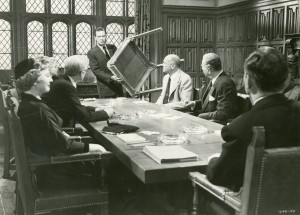
In his book The Films of Robert Wise, Richard C. Keenan argues that the climactic board meeting is great cinema: “. . . the last thirty minutes are as fine as anything Hollywood has ever produced.”
I agree. Some of the earlier material is overly melodramatic, especially that involving Julia Tredway, but that final sequence is so stirring, so morally right, so forcefully acted, that it transcends drama regarding business ethos to become dialogue about the future of America, and how to prevent backsliding into mediocrity and obsolescence. Leaders of today would be wise to listen to those words and redouble efforts to reinvest in the people and capabilities of the country rather than to siphon off profits for themselves. That sequence displays the qualities of great leadership, thanks to the scriptwriting of Ernest Lehman, the sensitive direction of Robert Wise, the sharp editing of Ralph E. Winters, and the commanding presence of William Holden.
One great sequence doesn’t make a great movie, however. What does is powerful collaborative effort, clarity of dramatic focus and, well, whatever fairy dust happens to fall on those blessed productions. Movie magic is always difficult to analyze and impossible to reproduce. Executive Suite boasts a great cast, but if Holden or March had been miscast, it could have been ugly. Holden, who had won an Oscar just the year before with Stalag 17, is perfect as the reluctant recruit to run the company. If anything, he is better here than he was in Billy Wilder’s P.O.W. film. And Fredric March, a two-time Oscar winner nearing the twilight of his film career, proves himself a superb character actor. The script needs Loren Shaw to be personally cold yet professionally compelling, and March delivers. It’s a great portrayal of an ambitious but neurotic man who spurs himself toward a long-cherished goal. The other actors are very good as well, especially Walter Pidgeon, yet it is Nina Foch who nabbed an Oscar nod for her role as Erica Martin. Erica keeps her emotions in check throughout, yet it is clear what she feels and how she is suffering as the company teeters on the precipice of doom. Ultimately, it is she who represents all of the hard-working people who have made the company what it is and it is through her reaction that we can confirm the company’s new direction is a good one.
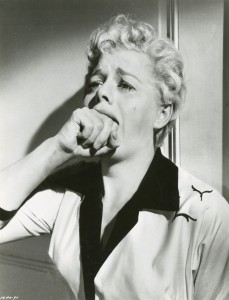
Keeping all of the star egos in check was the responsibility of director Robert Wise. Before the big boardroom meeting, he took a day to stage the action with the actors, set up his camera angles and run through it all. He also made the unusual decision to avoid a standard music score. It was felt that the material did not require the dramatic boost of a swelling score, and it does not. I don’t think a music score would have hurt the film, but it really doesn’t need it. Nor did Wise rely on standard editing tricks, fades and dissolves, to indicate passage of time or change of location. Wise decided to employ straight cuts because the action seemed so straightforward. The result is a film that never loses pace, that continues to build toward its accumulative climax with inexorable traction.
The one area where the film falters — only because of its business model, where women were not admitted to the top tier — is its standardized view of women as support systems for the male executives. Even here, Wise tried to do what he could, showing Mary Walling (June Allyson) playing catch with son Mike (Tim Considine), but there is no avoiding the lack of women in the boardroom. Times have changed, thankfully, but it is daunting to see movies where such gender prejudice was simply taken for granted. If the film were to be remade today, at least a couple of the vice presidents would undoubtedly be female.
Surprisingly, to me at least, Executive Suite was remade! In 1976-77, a television series which I don’t recall at all placed Don Walling as a California company’s chief executive officer. “Executive Suite” the series lasted one season, eighteen one-hour episodes, before descending to oblivion. The cast included Mitchell Ryan as Walling, Sharon Acker, Leigh McCloskey, Wendy Phillips, Stephen Elliott, Gwyda Donhowe, Byron Morrow, Madlyn Rhue, William Smithers, Joan Prather and Brenda Sykes. Despite some familiar faces, this is hardly the all-star cast of the movie version.
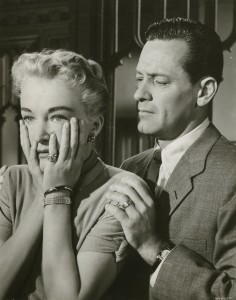
The movie was a solid hit for MGM, grossing $2.8 million, putting it just ahead of Alfred Hitchcock’s Dial M for Murder. It was well received, and at awards time collected quite a few nominations. Its four Oscar nominations were for Supporting Actress (Foch), Costume Design (B&W), Cinematography (B&W) and Art Direction (B&W), three of which it lost to On the Waterfront and Costume Design to Sabrina. The film won the Ensemble Acting award at the Venice Film Festival and the National Board of Review named it a Top Ten Film and Nina Foch the Best Supporting Actress of the Year. The British Film Institute nominated the film and actor Fredric March as among the best of the year as well. And the Directors Guild of America nominated Robert Wise for its top prize.
Is Executive Suite a classic? Absolutely. It is an influential film which jump-started the big-business sub-genre in the mid-1950s, and a rewarding one, because it is so good. The cast is flawless, led by handsome and charismatic William Holden at his finest, all directed superbly by Robert Wise. It would have been easy for this to turn soapy, and at times it does, but it always gets back on track. And when most movies lose their way not knowing how or when to end, Executive Suite delivers a knock-out climax that not only wraps up its own story but has a hell of a lot to say about things above and beyond the movie itself. It is a film that, while dated in a specific era, has remained timeless in the manner in which it asks viewers to question everything they know about big business, and whether the pursuit of money is worth all the personal turmoil which that pursuit entails. It also, like so many other Robert Wise films, takes a solid stand regarding its subject. It is a terrific film with a great boardroom climax. ☆ ☆ ☆ 1/2. 16 September 2014.
